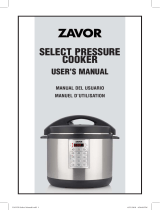
Important safety information
For your safety, this appliance complies with applicable standards and regulations:
- Pressure vessel directive
- Materials in contact with food
- Environment
•
This product has been designed for domestic use only. Any commercial use, inappropriate use
or failure to comply with the instructions, the manufacturer accepts no responsibility and the
guarantee will not apply.
•
Take time to read all of the instructions and always refer back to the “User Guide”.
•
Just like for any other cooking appliance, always pay close attention to it, especially when using
pressure cooker near children.
• Never place the pressure cooker in a hot oven. Only vessels with stainless steel handles and
stainless steel pan lid can be put in the oven.
• Always be very careful when moving your pressure cookerunder pressure. Never touch hot
surfaces (in particular metal parts). Use the handles and knobs. Use gloves where necessary.
• Regularly check that the handles of the cooker are fitted correctly. Tighten them if necessary.
• Never use yourpressure cookerfor any purpose other than the one it was designed for.
• The pressure cooker cooks under pressure. Scalding injuries may result from unsuitable or
incorrect use. Always make sure that your pressure cooker is properly closed before starting
to use it. Refer to the section headed "Closing".
• Always make sure that the valve is in decompression position before opening the pressure
cooker.
• Never force the pressure cooker to open. Always make sure that the pressure inside it has
dropped. Refer to the section headed “Safety”.
• Never use the pressure cooker without any liquid in it as this will seriously damage it. Always
make sure that there is enough liquid in it during cooking.
• Use heat source(s) that are compatible with the pressure cooker, in line with the instructions
for use.
• Never make a recipe with milk in pressure cooker.
• Do not use sea salt in the pressure cooker, add table salt at the end of the cooking time.
• Never fill the pressure cooker more than two-thirds full (the maximum mark).
• For food that expands during cooking, like rice or dried vegetables or stewed fruit, never fill
the pressure cooker more than half full. For some soups based on pumpkins, zucchinis, let
the pressure cooker cool down for a few minutes, then cool it under cold water.
• After cooking meat with a superficial outer skin (e.g. tongue…) that may expand with the
pressure, never stab the meat while the skin looks swollen under pressure for you may be
scalded. We recommend that you pierce the meat before cooking.
• When cooking food with a thick texture, (e.g. split peas, rhubarb…), the pressure cooker
should be shaken slightly prior to opening to ensure that these foods do not spray out.
• Always make sure that the valves are not blocked before use. Refer to the section headed
“Before Cooking”.
• Never use the pressure cooker to deep fry using oil under pressure.
• Never take any action on the safety systems other than that which is described in the
instructions for cleaning and maintenance.
• Only use TEFAL genuine spares parts designed for your product model. This especially
means using a TEFAL cooker pan and lid.
• Alcohol vapour is inflammable. Bring alcohol to the boil for two minutes before putting the
lid on. Watch over your appliance when making alcohol based recipes.
• Never use the pressure cooker to store acidic or salty foods prior to and after cooking as this
may damage the pressure cooker body.
• Never put the pressure cooker with folded handles* on a heat source.
Keep these instructions
* depending on model


















